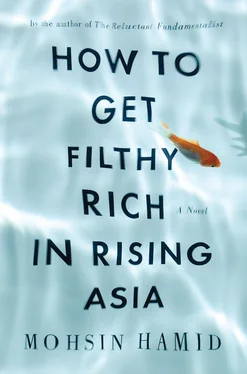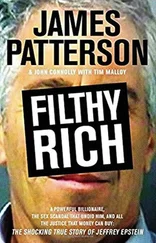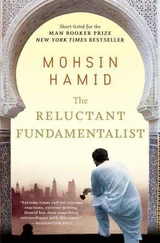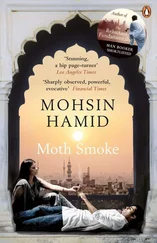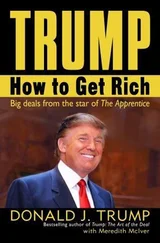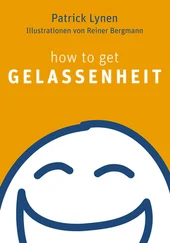As you and your parents and siblings dismount, you embody one of the great changes of your time. Where once your clan was innumerable, not infinite but of a large number not readily known, now there are five of you. Five. The fingers on one hand, the toes on one foot, a minuscule aggregation when compared with shoals of fish or flocks of birds or indeed tribes of humans. In the history of the evolution of the family, you and the millions of other migrants like you represent an ongoing proliferation of the nuclear. It is an explosive transformation, the supportive, stifling, stabilizing bonds of extended relationships weakening and giving way, leaving in their wake insecurity, anxiety, productivity, and potential.
Moving to the city is the first step to getting filthy rich in rising Asia. And you have now taken it. Congratulations. Your sister turns to look at you. Her left hand steadies the enormous bundle of clothing and possessions balanced on her head. Her right hand grips the handle of a cracked and battered suitcase likely discarded by its original owner around the time your father was born. She smiles and you smile in return, your faces small ovals of the familiar in an otherwise unrecognizable world. You think your sister is trying to reassure you. It does not occur to you, young as you are, that it is she who needs reassurance, that she seeks you out not to comfort you, but rather for the comfort that you, her only recently recovered little brother, have in this moment of fragile vulnerability the capacity to offer her.

IT’S REMARKABLE HOW MANY BOOKS FALL INTO THE category of self-help. Why, for example, do you persist in reading that much-praised, breathtakingly boring foreign novel, slogging through page after page after please-make-it-stop page of tar-slow prose and blush-inducing formal conceit, if not out of an impulse to understand distant lands that because of globalization are increasingly affecting life in your own? What is this impulse of yours, at its core, if not a desire for self-help?
And what of the other novels, those which for reasons of plot or language or wisdom or frequent gratuitous and graphic sex you actually enjoy and read with delighted hunger? Surely those too are versions of self-help. At the very least they help you pass the time, and time is the stuff of which a self is made. The same goes for narrative nonfiction, and doubly so for non-narrative nonfiction.
Indeed, all books, each and every book ever written, could be said to be offered to the reader as a form of self-help. Textbooks, those whores, are particularly explicit in acknowledging this, and it is with a textbook that you, at this moment, after several years in the city, are walking down the street.
Your city is not laid out as a single-celled organism, with a wealthy nucleus surrounded by an ooze of slums. It lacks sufficient mass transit to move all of its workers twice daily in the fashion this would require. It also lacks, since the end of colonization generations ago, governance powerful enough to dispossess individuals of their property in sufficient numbers. Accordingly, the poor live near the rich. Wealthy neighborhoods are often divided by a single boulevard from factories and markets and graveyards, and those in turn may be separated from the homes of the impoverished only by an open sewer, railroad track, or narrow alley. Your own triangle-shaped community, not atypically, is bounded by all three.
Arriving at your destination, you see a whitewashed building with a plaque declaring its name and function. This is your school, and it is wedged between a tire-repair stall and a corner kiosk that derives the bulk of its revenues from the sale of cigarettes. Until the age of about twelve, when the opportunity cost of forgone wages becomes significant, most children in your area do in fact manage to go to school. Most, but by no means all. A boy your height is working shirtless in the tire-repair stall. He watches you now as you pass.
There are fifty pupils in your class and stools for thirty. The others sit on the floor or stand. You are instructed by a single hollow-cheeked, betel-nut-spitting, possibly tubercular teacher. Today he takes you through your multiplication tables. This he does in a distracted chant, his preferred, indeed only, pedagogical tool being enforced rote memorization. Parts of his mind not responsible for control over the tissue and bone of his vocal apparatus wander far, far away.
Your teacher chants, “Ten tens, a hundred.”
The class chants it back.
Your teacher chants, “Eleven elevens, a hundred twenty-one.”
The class chants it back.
Your teacher chants, “Twelve twelves, a hundred thirty-four.”
One foolhardy voice interrupts. It says, “Forty-four.”
There is a hushed silence. The voice is yours. You spoke without thinking, or at least without thinking sufficiently ahead.
Your teacher says, “What did you say?”
You hesitate. But it has happened. There is no way back.
“Forty-four.”
Your teacher’s tone is soft with menace. “Why did you say that?”
“Twelve twelves are a hundred forty-four.”
“You think I’m an idiot?”
“No, sir. I thought you said a hundred thirty-four. I made a mistake. You said a hundred forty-four. I’m sorry, sir.”
The entire class knows your teacher did not say a hundred forty-four. Or perhaps not the entire class. Much of the class was paying no attention, daydreaming of kites or assault rifles, or rolling nasal residue into balls between their thumbs and forefingers. But some of them know. And all of them know what will happen next, if not the precise form it will take. They watch now in horrified fascination, like seals on a rock observing a great white breaching beneath one of their own, just a short swim away.
Most of you have in the past been punished by your teacher. You, as one of the brightest students, have drawn some of the most severe punishments. You attempt to hide your knowledge, but every so often bravado gets the better of you and it comes out, as it just has, and then there is hell to pay. Today your teacher reaches into the pocket of his tunic, where he keeps a small amount of coarse sand, and grips you by the ear, the sand on his fingertips adding abrasion to the enormous pressure he applies, so that your earlobe is not only crushed but also made raw and slightly bloody. You refuse to cry out, denying your torturer satisfaction, and ensuring thereby that the punishment you receive is prolonged.
Your teacher did not want to be a teacher. He wanted to be a meter reader at the electric utility. Meter readers do not have to put up with children, work comparatively little, and what is more important, have greater opportunity for corruption and are hence both better off and held in higher regard by society. Nor was becoming a meter reader out of your teacher’s reach. His uncle worked for the electric utility. But the one position as meter reader this uncle was able to facilitate went, as all things most desirable in life invariably went, to your teacher’s elder brother.
So your teacher, who narrowly failed his secondary-school final examination but was able to have the results falsified, and with his false results, a bribe equivalent to sixty percent of one year’s prospective salary, and a good low-level connection in the education bureaucracy in the form of a cousin, secured only the post he currently occupies. He is not exactly a man who lives to teach. In fact he hates to teach. It shames him. Nonetheless he retains a small but not nonexistent fear of losing his job, of somehow being found out, or if not losing his job then at least being put in a position where he will be forced to pay yet another and indeed larger bribe in order to retain it, and this fear, augmented by his sense of abiding disappointment and his not unfounded conviction that the world is profoundly unfair, manifests itself in the steady dose of violence he visits upon his charges. With each blow, he tells himself, he helps education penetrate another thick skull.
Читать дальше
